 Melissa Anderson
Melissa Anderson
Where there’s a willy there’s a way: João Pedro Rodrigues’s new film about climate collapse, Portugal’s colonial past, and homoerotics in the firehouse.
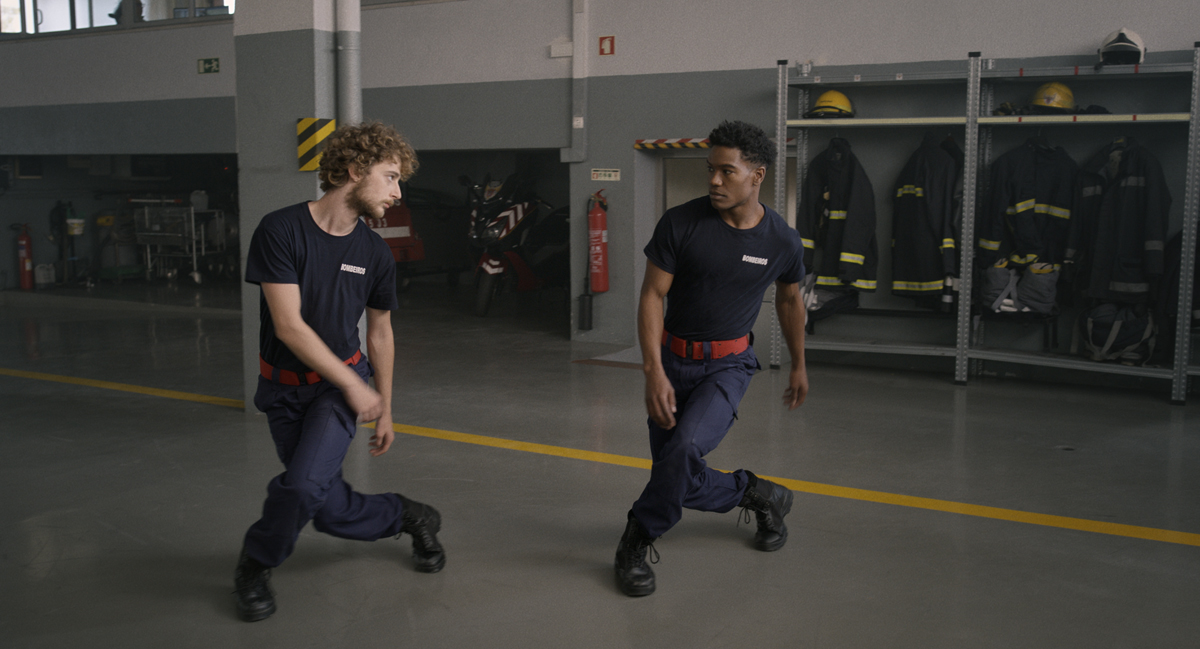
Mauro Costa as Alfredo and André Cabral as Afonso in Will-o’-the-Wisp. Courtesy Films Boutique.
Will-o’-the-Wisp, directed by João Pedro Rodrigues, now playing at the IFC Center, 323 Sixth Avenue, New York City
• • •
Motored by carnal action as much as by personal crises and emotional disintegration, the films of João Pedro Rodrigues drolly explore the terrain where XXX meets existentialism. O Fantasma (2000), the Portuguese auteur’s bold debut feature, tracks the nocturnal prowlings of a homo horndog garbage collector in Lisbon. The sex-hungry sanitation worker never quits the hunt, his quest leading him to a geographic, if not psychic, abyss. Bizarre doublings are not uncommon in his films. Two Drifters (2005), for example, features an outré instance of gender reassignment: a woman who works as a roller-skating supermarket price checker becomes convinced she’s carrying the baby of a dead gay guy, whose spirit she insists has transmigrated into her body; by film’s end, she—he?—is frenziedly getting it on with the deceased’s grieving boyfriend. Similarly, in The Ornithologist (2016)—rich with al-fresco fucking and fertility cults—Rodrigues, at first simply dubbing the voice of lead actor Paul Hamy, replaces him entirely in the concluding minutes.
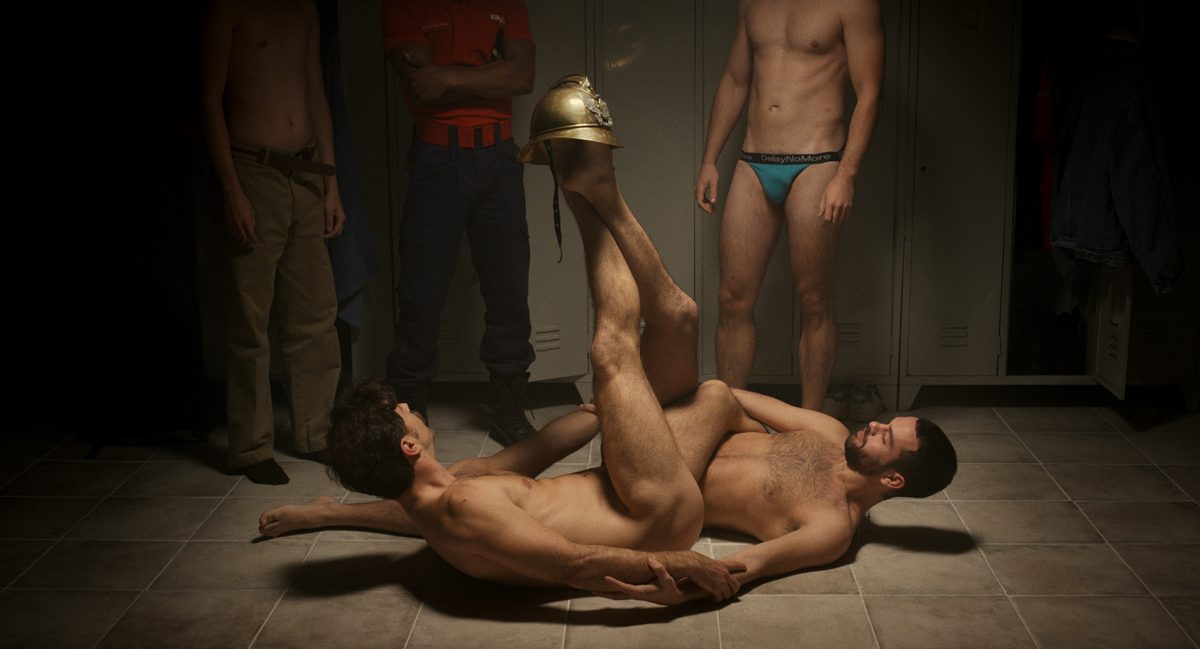
Still from Will-o’-the-Wisp. Courtesy Films Boutique.
Will-o’-the-Wisp may be the breeziest feature Rodrigues has made to date—and the most politically topical. (Running sixty-seven minutes, it’s also his briskest, and is one of two films by the director that premiered last year. The other, Where Is This Street? Or with No Before and After—which Rodrigues codirected with João Rui Guerra da Mata, his longtime creative collaborator and romantic partner—is a pandemic-lockdown project that revisits the Lisbon locales, now eerily empty, of a key Portuguese film from 1963.) Billed as “a musical fantasy,” Will-o’-the-Wisp bears the Rodrigues hallmarks of lusty same-sex action and a protagonist—a regent at various stages of his life—facing critical turning points. But the royal isn’t the only one on the brink. The fate of the planet lies in the balance, too, and a reckoning with Portugal’s colonialist past is long overdue.
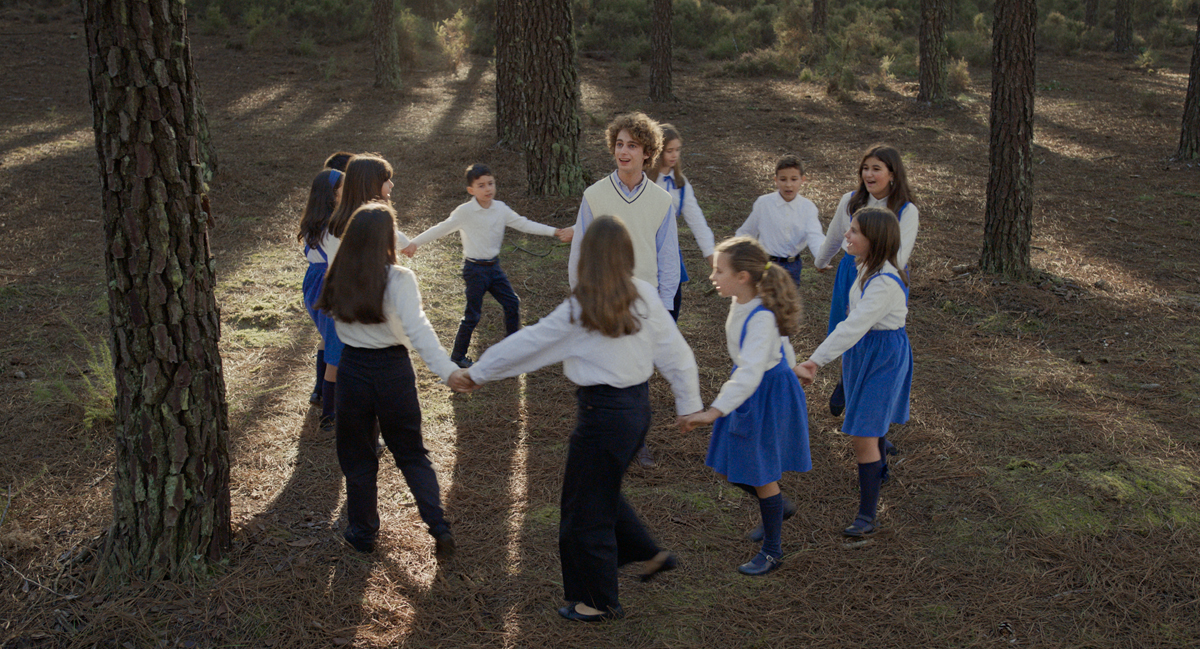
Mauro Costa as Alfredo and cast in Will-o’-the-Wisp. Courtesy Films Boutique.
No matter how weighty the theme, though, Rodrigues is never one for sanctimony. He establishes his ribald, puckish tone from the jump: the date 2069 flashes on the screen, the numbers the color of blood. In this année érotique of the future, Prince Alfredo (Joel Branco), wizened and flatulent, recalls his youth from his deathbed. As the film winds back to 2011, the shaveling lord (now played by Mauro Costa), roaming the Leiria Pine Forest in central Portugal with his overweening father (Miguel Loureiro), gazes up in awe at the trees that Dad proclaims “tumescent with sap.” (The conifers aren’t the only things that are engorged: timid Alfredo tries to hide the stiffy rising in his short pants. The response isn’t out of place in the work of a filmmaker who’s often filmed forests as enchanting, sensual spaces.) Blue-blooded father and son start to croon “A Tree, a Friend,” an anodyne 1984 song for kids about ecology; soon to join them is a children’s choir, their sudden appearance in the copse as incongruously delightful as any moment in a Jacques Demy musical.
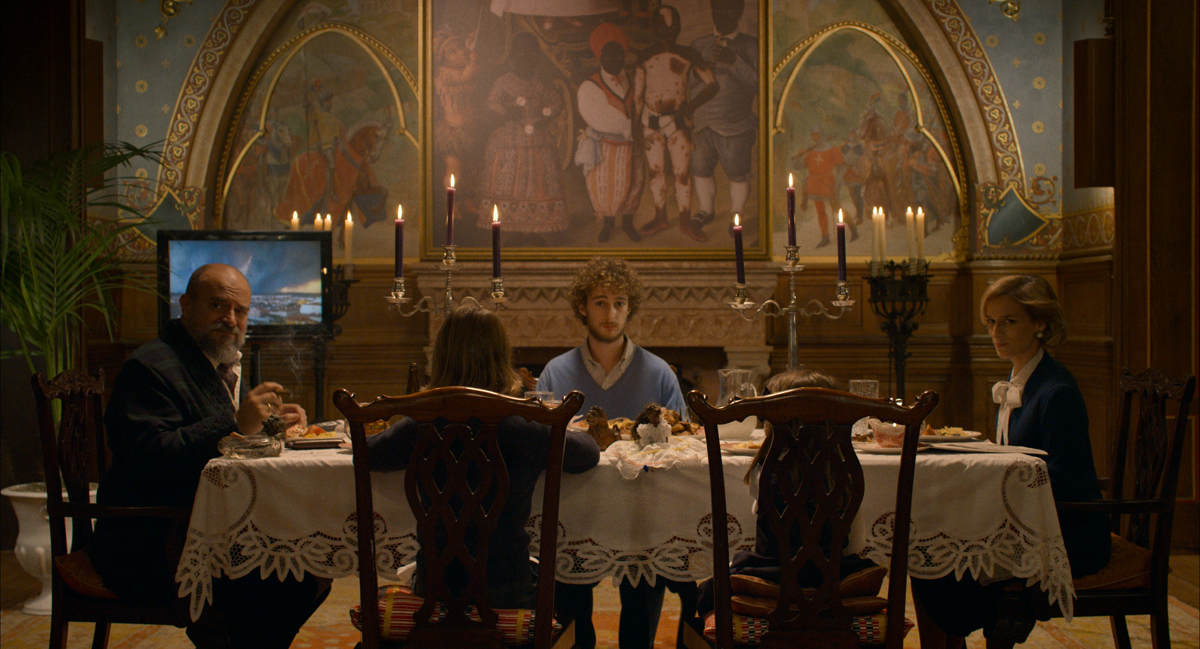
Miguel Loureiro as Eduardo, Mauro Costa as Alfredo, and Margarida Vila-Nova as Teresa in Will-o’-the-Wisp. Courtesy Films Boutique.
Cut to “some years later”: so profound is the young royal’s dendrophilia that, during family dinner, with a TV news report about devastating infernos playing in the background, he recites a Greta Thunberg speech before announcing that he wants to be a volunteer firefighter to save the forests. Unbowed by his parents’ haughty derision—his mother (Margarida Vila-Nova) proves even more supercilious and far-right than his papai—the curly-haired naif abandons his cosseted life to fulfill his higher calling at the local fire brigade.

Still from Will-o’-the-Wisp. Courtesy Films Boutique.
That Rodrigues, with his regular cinematographer Rui Poças, would salaciously linger on the homoerotics of a fire station—a segment devoted to the exercise drills performed by hunks in matching black tees and shorts is in no hurry to end—comes as no surprise from this connoisseur of the libidinal. But Rodrigues offers his own wry spin on this most common of gay-fantasy settings. In the locker room, the laddermen, most clad in briefs or nothing at all, welcome Alfredo to the fold by demonstrating the poses they’ll assume for that year’s high-concept beefcake calendar—tableaux that mimic the arrangement of bodies in paintings by Caravaggio and Bacon. Crucially, the commander of this crew of beefcake isn’t another gym-toned Adonis but a mountainous middle-aged woman (Cláudia Jardim), who brings to Will-o’-the-Wisp the same acerbic élan that Brigid Berlin injected into Warhol’s movies.
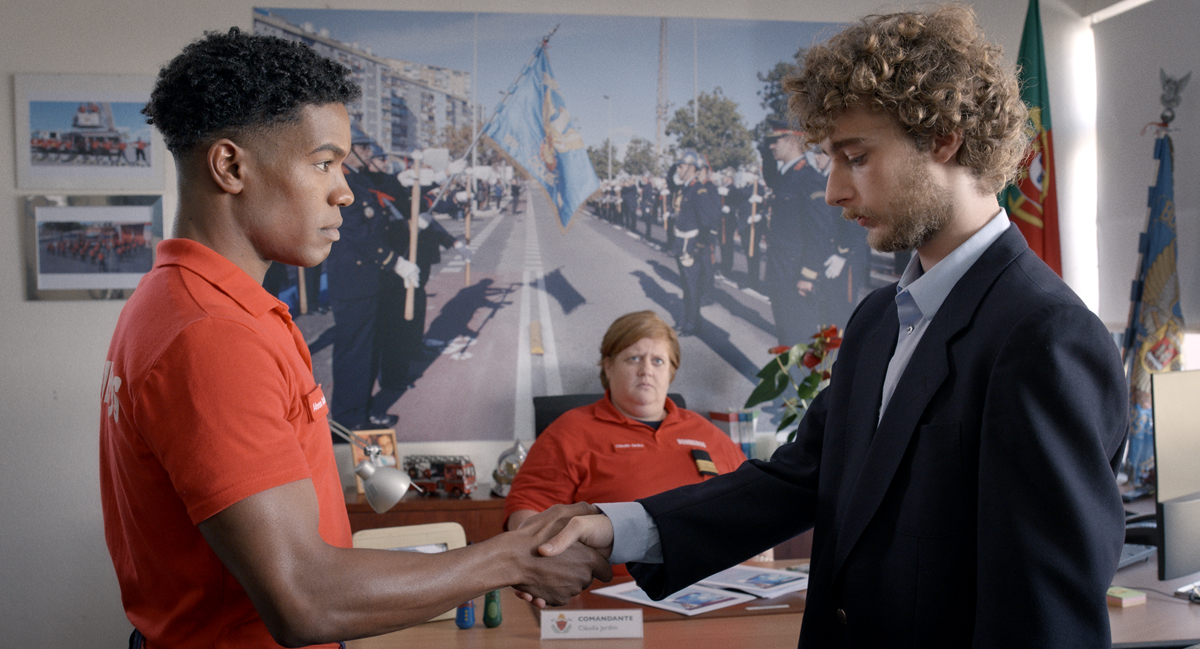
André Cabral as Afonso, Cláudia Jardim as the Commander, and Mauro Costa as Alfredo in Will-o’-the-Wisp. Courtesy Films Boutique.
The Commander assigns twink Alfredo to be trained by Afonso (André Cabral), one the station’s few Black members. A spark ignites between the two at first handshake, the attraction deepening during CPR training and an all-squad dance number (equal parts MGM, Pina Bausch, and modern music video) set to an electro-hop track. Responding to an emergency call, the aristo and the prole will consummate their love on a patch of charred landscape. Sex is vital in Rodrigues’s films, but he doesn’t wish to sacralize it, choosing instead to highlight its absurdities: as Alfredo and Afonso hotly jerk each other off, the camera cuts to extreme close-ups of two enormous, obviously silicone dicks.
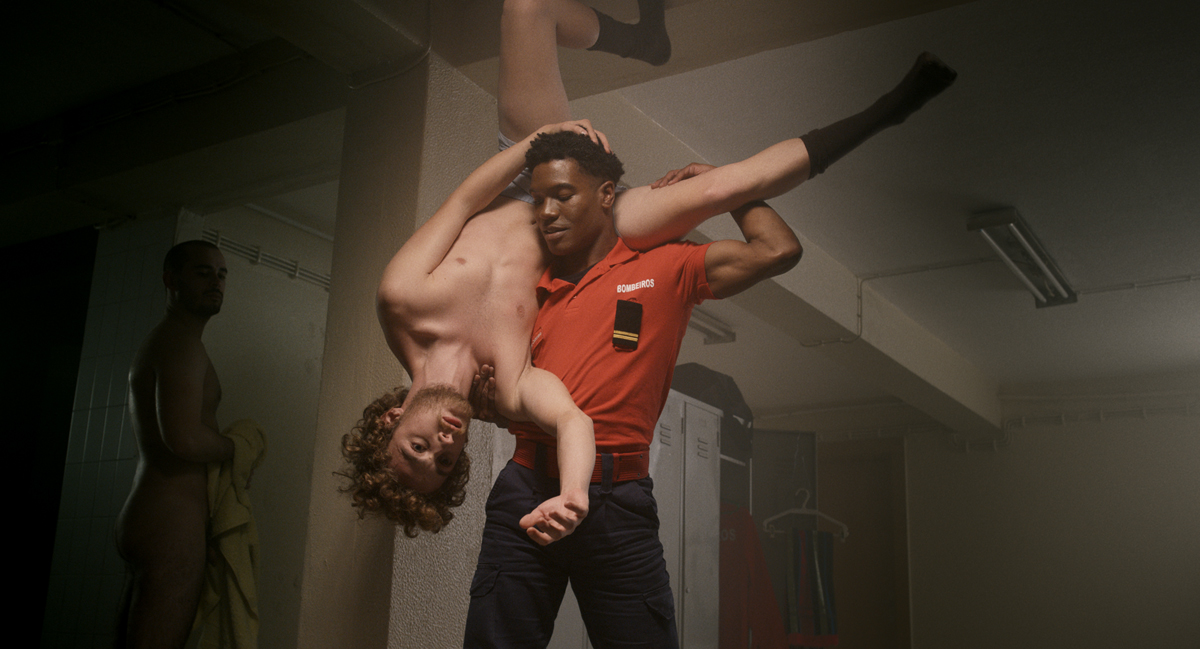
Mauro Costa as Alfredo and André Cabral as Afonso in Will-o’-the-Wisp. Courtesy Films Boutique.
Riskier are the terms the two young men use for each other in their coital and postcoital banter—racial ribbing along the lines of “imperialist” and “Hottentot Venus” (though a few terms are more incendiary). Deftly handled, the provocative exchange in no way derails the film; more important to Rodrigues is subtly calling attention to the grotesqueries of the Luso empire. During Alfredo’s performance of Greta Thunberg’s manifesto in the royal dining room, the camera alights on his parents’ art collection: a clump of baleful paintings and sculptures of “African” and other colonized individuals, the artifacts made all the more repellent when presented against the teenage Swedish activist’s fiery words (“The eyes of all future generations are upon you”).
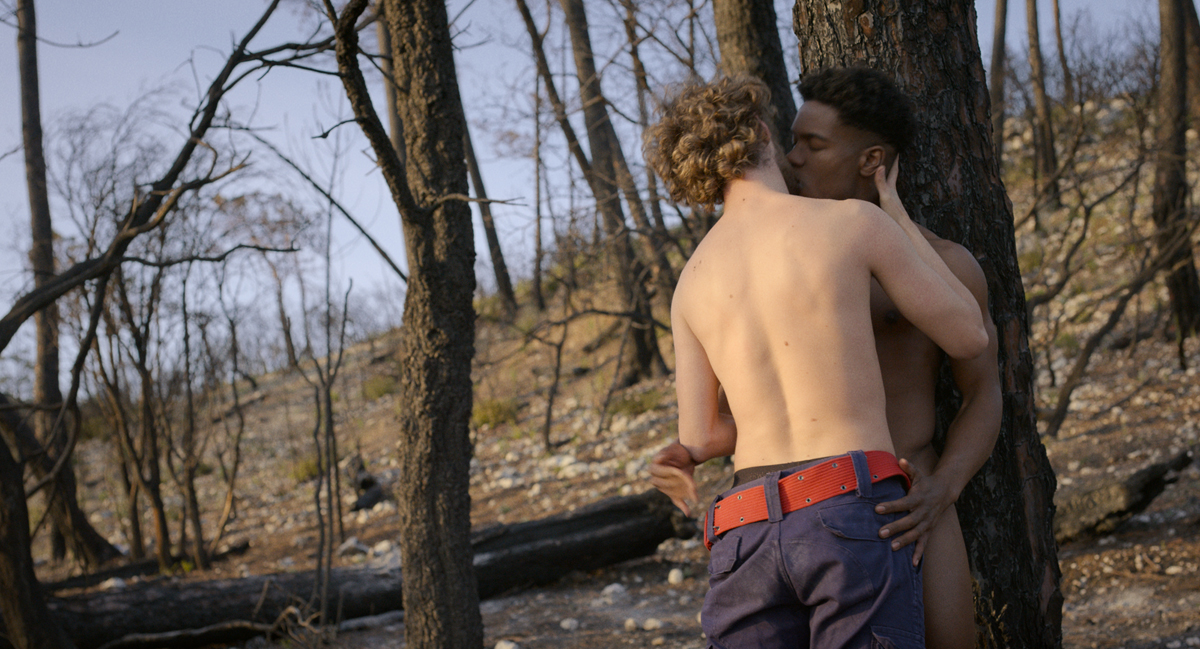
Mauro Costa as Alfredo and André Cabral as Afonso in Will-o’-the-Wisp. Courtesy Films Boutique.
And it is for the future generations (Gen ’69 2.0, or maybe call them nouveaux soixante-neufistes) that Rodrigues has the most hope. Contrary to one of the definitions of the film’s evocative title—an elusive goal—Will-o’-the-Wisp, in its final act, offers the unimaginable as a foregone conclusion.
Melissa Anderson is the film editor of 4Columns and the author of a monograph on David Lynch’s Inland Empire from Fireflies Press.